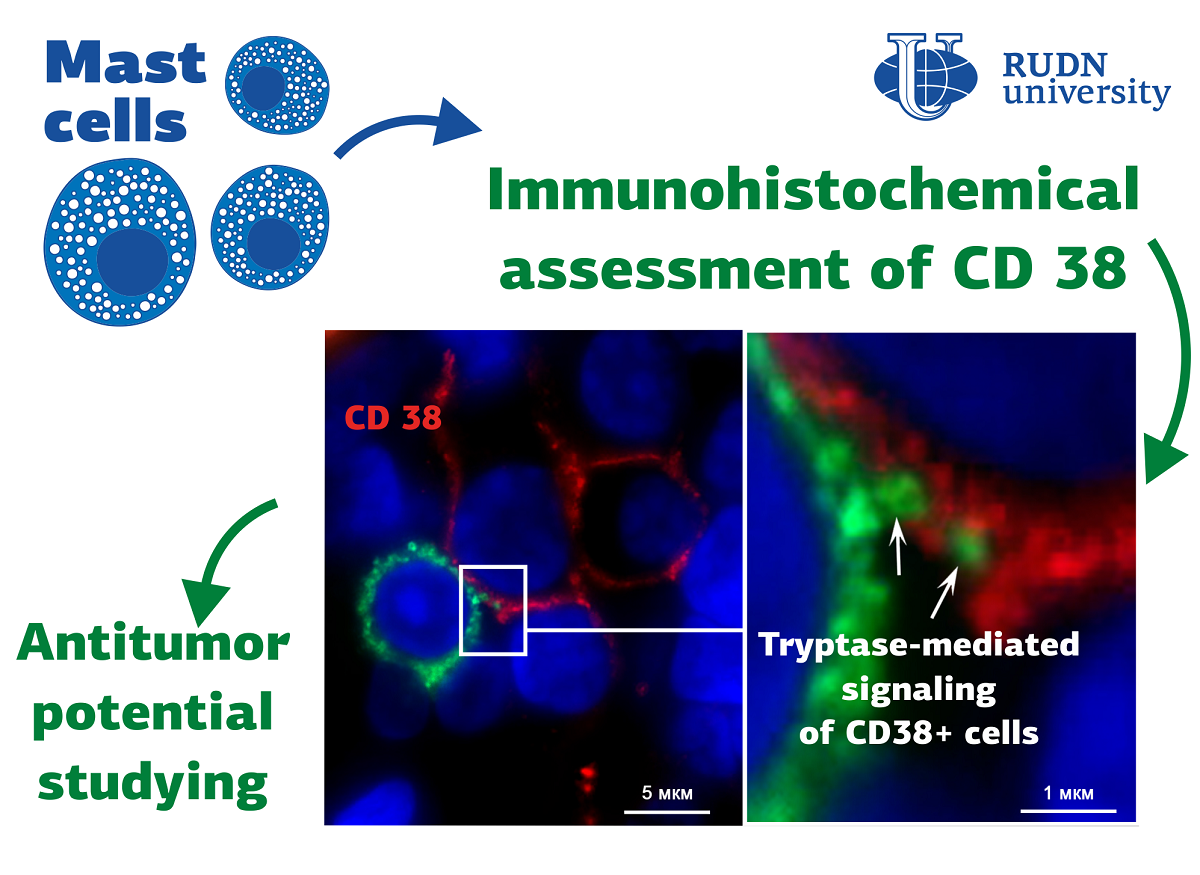RUDN University Scientist Shows A New Mechanism For The Formation Of Antitumorigenic Effects In The Tumor Microenvironment

Mast cells are involved in protecting the body from tumors, which have a multifaceted potential in the formation of molecular and biological features of a specific tissue microenvironment. The mechanisms of this participation are not yet fully clear. It is the aim of the most relevant fundamental biomedical research on oncogenesis. One of the possible tools for studying the issue is the assessment of the CD38 protein content in mast cells, which has already been studied on lymphocytes, red blood cells, platelets, neurons and many other cells. RUDN University professor together with colleagues from Germany proved that CD38 in mast cells can be seen and calculated in situ — using multiplex immunohistochemistry technologies.
“Despite the data obtained, it is clear that further studies are required into the expression and activity of CD38 in cells of the tumor microenvironment with a pronounced regulatory potential. Among them, mast cells (MCs), which have both protumorogenic and versatile antitumor effects These cells are a very promising target for cancer immunotherapy. However, there is still no literature that addresses histochemical imaging of CD38 in MCs”, said Dmitri Atiakshin, Doctor of Medicine, head of the Research and Educational Resource Center for Immunophenotyping, Digital Spatial Profiling and Ultrastructural Analysis Innovative Technologies at RUDN University
Doctors have proved that the expression of CD38 in organ-specific mast cells in situ can be studied using multiplex immunohistochemistry. It allows detecting the necessary proteins in specific tissue components with the corresponding antibody. The antibodies are labelled with a fluorescent dye or an enzyme. When an antibody binds to the desired protein, the labeled product of their reaction can be seen in a light microscope. The design of the research involved the study of mast cells in the human biomaterial of various organs in normal and pathological conditions, including the skin, tonsils, mammary gland and bone marrow. The samples were studied using multiplex immunomorphological analysis technologies. Its results were not only the detection of exoenzyme expression in a specific area of interest, but also the detailing of the selective interaction of immunocompetent cells of a specific tissue microenvironment with the visualization of cyto – and histotopographic features. As a result, the RUDN University doctors received a series of “photos” of CD38 in mast cells of different tissues with a wide interpretative field of pro-oncogenic or antitumorigenic effects.
The results of a molecular morphological study showed that CD38 expression in mast cells is not only organ-specific, but also depends on the nature of the pathology. The doctors also drew attention to important biotechnological details of the study related to the conformational features of the antibodies used to various CD380 epitopes. For example, antibodies to CD38 of the SP149 clone isolated from the rabbit’s body were the least effective for determining CD38 in the tissues of the tonsils and bone marrow. Thus, modern immunophenotyping technologies make it possible to use CD38 mast cells as an important marker of the tumor microenvironment and to identify new pathogenetically significant molecular mechanisms of carcinogenesis.
“The results of our immunohistochemical analysis confirmed the possibility of identifying CD38 in human MCs and opened new strategic ways to reveal the fundamental mechanisms of carcinogenesis. At the same time, the question of the specificity of the antibodies used remains fundamental since the different efficacies of antibodies clearly arises due to their affinity for various epitopes of the CD38 molecule”, said Dmitri Atiakshin, Doctor of Medicine, head of the Research and Educational Resource Center for Immunophenotyping, Digital Spatial Profiling and Ultrastructural Analysis Innovative Technologies at RUDN University.
The results are published in the journal Cells.
The project to develop a cellular model of the placenta became the winner in the Scientific Materials category of the Young Scientists 3.0 competition, organized with the support of the Presidential Grants Foundation and T-Bank.
Ten scientific journals published by RUDN University have been included in the highest level of the state list of scientific publications, the White List.
Forests are not only the lungs of the planet, but also home to millions of species. However, it has remained unclear how underground interactions between trees and fungi affect forest species richness in different climatic conditions. Previous studies have yielded conflicting results: in some regions, the dominance of certain fungi reduced tree diversity, while in others it increased it.
The project to develop a cellular model of the placenta became the winner in the Scientific Materials category of the Young Scientists 3.0 competition, organized with the support of the Presidential Grants Foundation and T-Bank.
Ten scientific journals published by RUDN University have been included in the highest level of the state list of scientific publications, the White List.
Forests are not only the lungs of the planet, but also home to millions of species. However, it has remained unclear how underground interactions between trees and fungi affect forest species richness in different climatic conditions. Previous studies have yielded conflicting results: in some regions, the dominance of certain fungi reduced tree diversity, while in others it increased it.